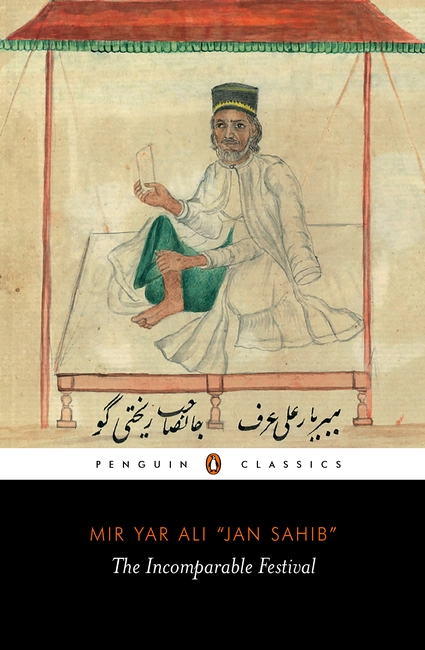
An indispensable translation of Jan Sahib’s poetic ethnography of nineteenth-century performers-Pasha M. Khan, chair in Urdu Language and Culture, McGill University
This is a truly extraordinary work, an important contribution to the cultural history of the subcontinent-Muneeza Shamsie, writer and literary critic
The translation is experimental, challenging traditional expectations in its approach to rhyme and meter-Carla Petievich, South Asia Institute, The University of Texas at Austin
The Incomparable Festival (Musaddas Tahniyat-e-Jashn-e-Benazir) by Mir Yar Ali (whose pen name was Jan Sahib) is a little known but sumptuous masterpiece of Indo-Islamic literary culture, presented here for the first time in English translation. The long poem, written in rhyming sestet stanzas, is about the royal festival popularly called jashn-e-benazir(the incomparable festival), inaugurated in 1866 by the Nawab Kalb-e-Ali Khan (r. 1865-87) with the aim of promoting art, culture and trade in his kingdom at Rampur in northern India. The task of commemorating the sights and wonders of the festival was given to the hugely popular writer of rekhti verse, the tart and playful sub-genre of the ghazal, reflecting popular women’s speech, of which Jan Sahib is one of the last practitioners.
Structured as an ode to the nawab, the poem is a world-album depicting various classes on the cusp of social upheaval. They include the elite, distinguished artists and commoners, brought together at the festivities, blurring the distinction between poetry, history and biography, and between poetic convention and social description. The book is a veritable archive of the legendary khayal singers, percussionists, and instrumentalists, courtesans, boy-dancers, poets, storytellers (dastango) and reciters of elegies (marsiyago). But, above all, the poem gives voice to the ‘lowest’ denizens of the marketplace by bringing to light their culinary tastes, artisanal products, religious rituals and beliefs, and savoury idioms, thereby focusing on identities of caste and gender in early modern society.
This Penguin Classics edition will be of interest not just to the Urdu and Hindi literary historian, but to specialists and readers interested in the histories of music, dance, and the performative arts, as well as scholars of gender and sexuality in South Asia. Lovers of Urdu poetry will find in it a forgotten masterpiece.
Imprint: India Penguin Classics
Published: Jul/2021
ISBN: 9780670093823
Length : 224 Pages
MRP : ₹299.00